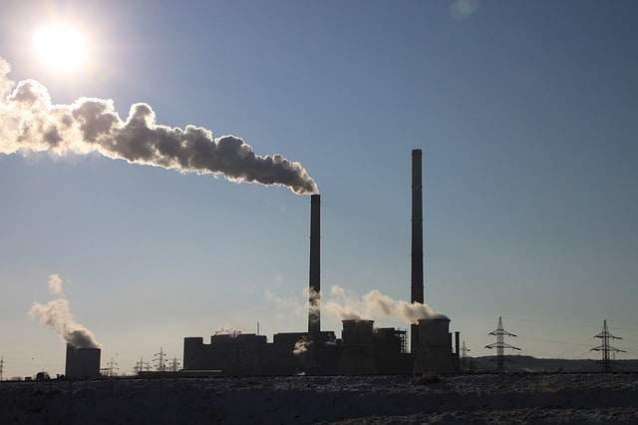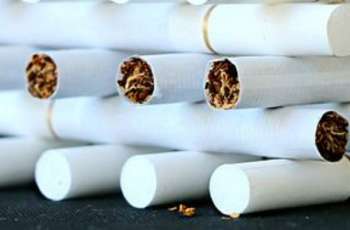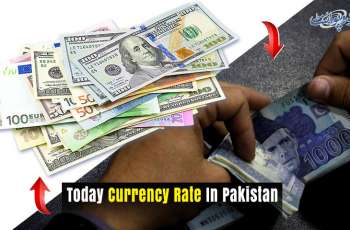The reduction of greenhouse gas emissions, caused by the slowdown of industrial activities in China and the global flight restrictions, will be short-lived and should not mislead governments into thinking that clean energy transition investment may be put on a back burner until the economy recovers from the shocks of the coronavirus pandemic, experts and climate activists told Sputnik
MOSCOW (Pakistan Point News / Sputnik - 20th March, 2020) The reduction of greenhouse gas emissions, caused by the slowdown of industrial activities in China and the global flight restrictions, will be short-lived and should not mislead governments into thinking that clean energy transition investment may be put on a back burner until the economy recovers from the shocks of the coronavirus pandemic, experts and climate activists told Sputnik.
Satellite images of the atmosphere revealed by NASA and the European Space Agency show an incredible picture: the yellow-brown cloud of nitrogen dioxide (NO2) emissions above the Chinese capital region disappeared gradually within just one month of the coronavirus outbreak. From mid-January to mid-February, the dramatic drop in NO2 emissions resulted in 21 percent more clear sky days in China.
A study by UK-based website Carbon Brief estimated that carbon dioxide (CO2) emissions in China fell by a quarter or more in February.
The abrupt reduction of industrial activity due to the nationwide quarantine has led to the economy operating at 25 percent below usual levels. The country is usually responsible for 27 percent of global emissions.
Restrictions imposed by governments in a bid to contain the spread of the coronavirus resulted in the suspension of numerous international flights, and the cancellation of national and international events, and personal travel plans. It therefore should come as no surprise that there has been a decrease in carbon dioxide emissions due to reduced fuel consumption. Experts said that the same effect was observed during the 2008 financial crisis, when economic activities temporarily crumpled, and emissions went down before eventually bouncing back.
"The overall emissions in 2020 might be lower thanks to coronavirus, but if we don't make sure that the right measures are taken, this is going to be a very temporary drop and emissions will grow again in the coming years ... It's a temporary reduction of emissions due to reduction of economic activity, but there is nothing that guarantees that it could bring long-lasting sustainable change, while there are some benefits in the short-term," Wendel Trio, the director of the Climate Action Network Europe NGO, told Sputnik.
Experts also said there was little room for optimism regarding this positive curve since the Chinese economy was likely to quickly rebound.
"There are two aspects: short-term and long-term. In the short-term of course we will see emissions reductions ... But we don't know yet the scale of the pandemic and the extent to which it will influence people's behavior, government's budget and the state of economy throughout the world. It's likely that economies will rebound to some of business as usual practices ... Probably we should be careful with this forecast. Of course for now ... it is a small effect. But in the longer term we will see how the Chinese economy recovers," Ivetta Gerasimchuk, the head of sustainable energy supplies in the International Institute foe Sustainable Development in Geneva, told Sputnik.
OPPORTUNITY TO RETHINK CONSUMPTION
With millions of people under quarantine worldwide, COVID-19's surprising effect on climate has become more apparent. According to the European Space Agency, NO2 concentrations have fallen drastically in Italy, the hardest-hit European nation. Moreover, water in the canals of Venice has become clear for the first time in a while. Researchers also measured a 50 percent drop in carbon monoxide emissions over the past two days in megalopolises such as New York due to less cars and trucks being on the roads.
But experts warned to Sputnik that emissions were likely to bounce back right after the pandemic is curbed, insisting that so-called social distancing practices were not a sustainable climate solution.
"Definitely, if we are serious about preventing the most dangerous forms of climate change we will need to do more than just technological change. We need to also look at how we can change our society, reduce consumption. These measures taken by governments make it clear that this is possible to take drastic action when we really need it and for citizens to accept, but I would hesitate to say that this is a good example," Trio said.
The expert stressed that people should first of all understand that they can live the same as before, but just consume less and make other lifestyle preferences. The current epidemic does prompt people to be more aware, but that "more sustainable options" were still needed to ensure a long-term effect, according to Trio.
On the other hand, the effect on the aviation sector, a significant contributor to global pollution, may last longer, Gerasimchuk said.
"Now we also have a very significant impact on the aviation. Now people are starting to work form home, and if this takes route, probably we will have fewer unnecessary meetings. That may have a longer-term affect on the aviation and some other industries like cruise ships, because people will be afraid for a long time to be confined on a cruise ship," she said.
The expert went on to point out that the coronavirus outbreak had done more for climate than any government policy ever did.
"It's a very unfortunate situation where the coronavirus is doing more for climate than we saw from some governments, which was largely insufficient. Current climate action is not enough, and unfortunately it's not enough everywhere. There are some countries, which are trying to do a little bit more, and some countries are totally ignoring the problem," the expert said.
Gerasimchuk called for concrete climate action, such as an increase in taxation on fossil fuel producers.
"If we want to see reduction of emissions in the longer term, governments should start taxing fossil fuels more. And I think that may be one of the scenarios because governments will need a lot of resources, a lot of money to fund recovery ... So those economies who are interested in clean energy transition will try to balance the interests, but it depends on the sector, it depends on the country," she stated.
CORONAVIRUS SHOULD NOT CUT CLEAN ENERGY INVESTMENT
The biggest concern of environmental NGOs now is that the consequences of the economic disruption across the globe will lead to climate action funding vanishing from governments' priority lists. Preserving green investment and the clever bankrolling of businesses are key to building sustainable economies of the future, experts argued.
"It definitely is a risk and a challenge. We've seen already the Polish government and the Czech government's comments that the climate change shouldn't be a priority right now and we think this is not a smart suggestion ... We shouldn't solve one priority by neglecting another one ... If we don't solve the climate crisis we will see that impact coming in the following years ... We think that whenever possible we should keep the climate crisis in our minds when we take decisions about the future [economic] recovery," Trio said.
According to Trio, the core concern is not the impact of the coronavirus crisis itself but the path that governments will choose to revive the economy.
"And governments can of course ensure that the economic support they give to companies actually helps those companies to make a transition towards more climate-friendly economy," he added.
Nick Bryer, a campaigner for climate NGO 350.org in Europe, told Sputnik that central banks and regulators now have an opportunity to channel their subsidies to support green energy transition and create new jobs in this sector.
"Central banks like the European Central Bank have already started pumping money to stabilize the economy. It is so important to learn the lessons from the financial crash in 2008 and make sure we bail out the people and planet, not the big polluters. Regulators need to pull the lever that channels money into real, long-lasting solutions, not the one that releases more finance to prop up the fossil fuel industry only to accelerate climate breakdown and drive us into another economic crash in years to come," he warned.
Bryer insisted that governments should come up with a "green economic stimulus package" that provides social safety nets, and creates low-carbon jobs and sustainable energy for all. This way, the world would get a healthier society and build a "resilient" economy in the process, according to the campaigner.
Gerasimchuk agreed that a lot would depend on which industries received government support to tackle the COVID-19 crisis. Oil industries will clearly have to deal with the consequences of reduced consumption and a economic slowdown, as well as the historic slump in oil prices, she said.
"It's not like the green economy is an exception. And there are tremendous problems for the fossil fuels sector as well, because at the oil prices that we have right now about $30 per barrel oil production in many new fields is not economically viable, so they will have to shut down like high-cost production in Canada, shell production in the US to a certain extent is not viable under this price. There will be consequences for them as well. And in terms of renewable energy it comes down to the stimulus what sectors the governments will be supporting during recovery," she said.
GLOBAL WARMING HELPS DISEASES SPREAD TO NEW AREAS
Another important aspect in relation to pandemics and climate change is that warmer temperatures increase the spread of certain diseases, especially those transmitted by insects, which would settle in new areas previously too cold for them to live in.
"Global warming will indeed, in the long term, increase the chances of virus transmission from animal reservoirs... The travel connections have become very simple and numerous in today's world; mosquitoes follow and adapt. It is not excluded that in 10 to 20 years, where it is still too cold today, an increase in temperature, even of 2 degrees Celsius [3.6 degrees Fahrenheit] allows them to settle. The dengue virus has already made people sick in the South of France and in 2007 a brief epidemic of West Nile virus affected around fifteen people in the Camargue (France)," virologist Francois Dufrasne of the Catholic University of Louvain told Sputnik.
Irresponsible attitudes toward nature, too, opens a Pandora's box, with animal viruses mutating and being transmitted to people, the expert added.
"With deforestation in certain parts of the world, in Brazil or in Asia, the wild habitat is nibbled by humans and animals are getting closer to humans ... The SARS epidemic in 2002 was caused by the civet a small, very inconspicuous mammal that lives very close to humans. With global warming and human pressure on the last natural habitats, the risks of these viral epidemics are increasing," Dufrasne said.
Professor Jean-Luc Gala of the Centre for Applied Molecular Technologies at the Catholic University of Louvain, similarly said that the transmission of diseases got easier when people and animals lived in close proximity.
"This overcrowding, the appearance of mega-cities promote zoonoses the transmission of diseases from animals to humans. The virus forces itself a passage, which normally does not happen, by the promiscuity of pigs, poultry and other animals with the populations, in China for example. And this mutation of the virus that suddenly attacks humans, as in the case of the H1N1 avian flu, can be very serious: contagious and fatal," Gala told Sputnik.
Climate change therefore does and will continue to influence the onset of pandemics, he concluded.



